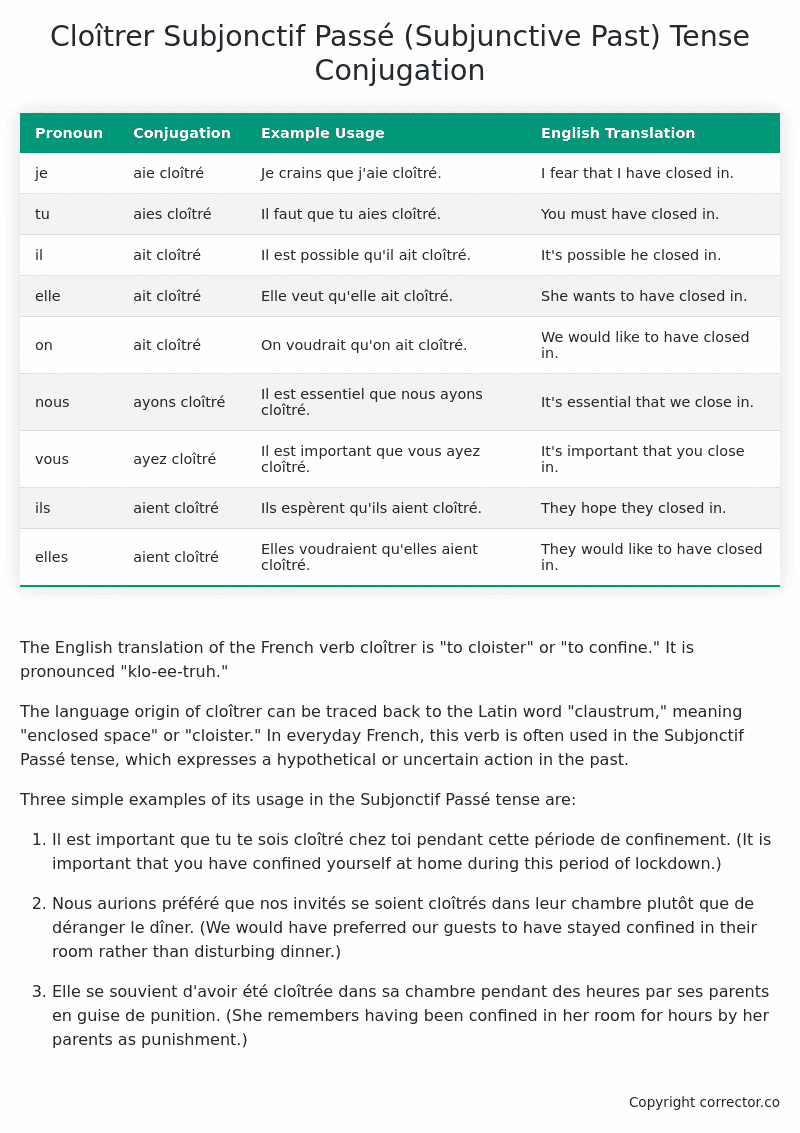Subjonctif Passé (Subjunctive Past) Tense Conjugation of the French Verb cloîtrer
Introduction to the verb cloîtrer
The English translation of the French verb cloîtrer is “to cloister” or “to confine.” It is pronounced “klo-ee-truh.”
The language origin of cloîtrer can be traced back to the Latin word “claustrum,” meaning “enclosed space” or “cloister.” In everyday French, this verb is often used in the Subjonctif Passé tense, which expresses a hypothetical or uncertain action in the past.
Three simple examples of its usage in the Subjonctif Passé tense are:
-
Il est important que tu te sois cloîtré chez toi pendant cette période de confinement. (It is important that you have confined yourself at home during this period of lockdown.)
-
Nous aurions préféré que nos invités se soient cloîtrés dans leur chambre plutôt que de déranger le dîner. (We would have preferred our guests to have stayed confined in their room rather than disturbing dinner.)
-
Elle se souvient d’avoir été cloîtrée dans sa chambre pendant des heures par ses parents en guise de punition. (She remembers having been confined in her room for hours by her parents as punishment.)
Table of the Subjonctif Passé (Subjunctive Past) Tense Conjugation of cloîtrer
| Pronoun | Conjugation | Example Usage | English Translation |
|---|---|---|---|
| je | aie cloîtré | Je crains que j’aie cloîtré. | I fear that I have closed in. |
| tu | aies cloîtré | Il faut que tu aies cloîtré. | You must have closed in. |
| il | ait cloîtré | Il est possible qu’il ait cloîtré. | It’s possible he closed in. |
| elle | ait cloîtré | Elle veut qu’elle ait cloîtré. | She wants to have closed in. |
| on | ait cloîtré | On voudrait qu’on ait cloîtré. | We would like to have closed in. |
| nous | ayons cloîtré | Il est essentiel que nous ayons cloîtré. | It’s essential that we close in. |
| vous | ayez cloîtré | Il est important que vous ayez cloîtré. | It’s important that you close in. |
| ils | aient cloîtré | Ils espèrent qu’ils aient cloîtré. | They hope they closed in. |
| elles | aient cloîtré | Elles voudraient qu’elles aient cloîtré. | They would like to have closed in. |
Other Conjugations for Cloîtrer.
Le Present (Present Tense) Conjugation of the French Verb cloîtrer
Imparfait (Imperfect) Tense Conjugation of the French Verb cloîtrer
Passé Simple (Simple Past) Tense Conjugation of the French Verb cloîtrer
Passé Composé (Present Perfect) Tense Conjugation of the French Verb cloîtrer
Futur Simple (Simple Future) Tense Conjugation of the French Verb cloîtrer
Futur Proche (Near Future) Tense Conjugation of the French Verb cloîtrer
Plus-que-parfait (Pluperfect) Tense Conjugation of the French Verb cloîtrer
Passé Antérieur (Past Anterior) Tense Conjugation of the French Verb cloîtrer
Futur Antérieur (Future Anterior) Tense Conjugation of the French Verb cloîtrer
Subjonctif Présent (Subjunctive Present) Tense Conjugation of the French Verb cloîtrer
Subjonctif Passé (Subjunctive Past) Tense Conjugation of the French Verb cloîtrer (this article)
Subjonctif Imparfait (Subjunctive Imperfect) Tense Conjugation of the French Verb cloîtrer
Subjonctif Plus-que-parfait (Subjunctive Pluperfect) Tense Conjugation of the French Verb cloîtrer
Conditionnel Présent (Conditional Present) Tense Conjugation of the French Verb cloîtrer
Conditionnel Passé (Conditional Past) Tense Conjugation of the French Verb cloîtrer
L’impératif Présent (Imperative Present) Tense Conjugation of the French Verb cloîtrer
L’infinitif Présent (Infinitive Present) Tense Conjugation of the French Verb cloîtrer
Struggling with French verbs or the language in general? Why not use our free French Grammar Checker – no registration required!
Get a FREE Download Study Sheet of this Conjugation 🔥
Simply right click the image below, click “save image” and get your free reference for the cloîtrer Subjonctif Passé tense conjugation!

Cloîtrer – About the French Subjonctif Passé (Subjunctive Past) Tense
Formation of the Subjonctif Passé
Everyday Usage Patterns
Interactions with Other Tenses
Present tense
Future tense
Conditional
Summary
I hope you enjoyed this article on the verb cloîtrer. Still in a learning mood? Check out another TOTALLY random French verb conjugation!


